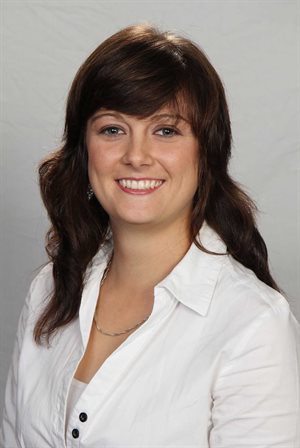GIBB civil design engineer Izadri van Niekerk believes the engineering industry is a catalyst for enriching lives and uplifting communities.

GIBB civil design engineer Izadri van Niekerk
She's a registered Professional Engineer, working on several notable projects, including the Sedibeng Regional Sanitation Scheme, the Bulk Sanitation Infrastructure Upgrade for Maclear, and the construction of Cala Wastewater Treatment Works.
Looking ahead, Van Niekerk has her sights set on the role of technical lead and managing an entire project team.
This Youth Month, she shares with us what excites her most about being an engineer, some of the achievements of which she's most proud, and how GIBB is supporting and empowering youth in the sector.
What sparked your initial interest in engineering?
I love the possibilities which the engineering industry provides to enrich the lives of everybody, from something as massive as a dam with a fully functional and well-maintained water supply network to something as mundane as a properly constructed gravel road for access.
How did you break into the industry?
After school, I studied at the University of Stellenbosch and obtained my Bachelor of Engineering (BEng Civil) in December 2011. In my second year of studies, GIBB gave me a bursary which led to my employment at the East London office in 2012. I have been working at GIBB since then. From the start of my career, I have been part of the sanitation team and currently have 11 years of experience. I obtained my Professional Engineer registration in December 2019.
What excites you the most about the engineering sector in SA?
The engineering industry has endless opportunities for growth and social upliftment across a broad spectrum of various fields.
It plays a critical role in creating an enabling business environment and it is a vital sector for the country's economy which is responsible for creating jobs, stimulating investment and improving infrastructure.
Tell us about some of the achievements of which you are most proud.
I am proud of being a registered Professional Engineer (Pr Eng), it took me seven years to achieve this personal goal. GIBB provided me with a platform to obtain relevant working experience under appropriate mentorship to enable me to qualify for my Pr Eng registration.
I am also proud of being part of the team which designed and constructed the 4.0 ML/day Elliot Wastewater Treatment Works. I was stationed in Elliot for two years as resident engineer, after which I came back to office and managed the close-out of the project. My responsibility shifted from site work to managing the replacement resident engineer, client and contractor, as well as project finances. This was my first project I worked on and seeing it coming to fruition was greatly satisfying.
What are some of your short and long-term career goals?
I would like to work myself up in the rankings to become a technical lead who manages an entire project team. I would also like to specialise in water hammer and surge analysis simulations as this is a field currently lacking in our team, and I find this subject very interesting.
What are some of the challenges young people face in engineering? How would you suggest they be overcome?
My opinion is that every engineer (experienced and young) is exposed daily to challenges which we need to overcome, some are technical, some contractual and others take you out of your comfort zone. This is, in my opinion, the core of engineering, i.e., being challenged and finding ways to solve those challenges.
When I started out as a young engineer in the civil engineering sector, I found it challenging to apply the theoretical knowledge learnt at university practically in the field, as all activities were a lot more complex and integrated from the various civil disciplines. GIBB’s experienced senior engineers aided all the young engineers, providing me with valuable insights that cannot be gained solely from books. This assisted me to build on my confidence, which allowed me to bridge this challenge to the extent that dealing with contractors and clients also became easier.
Another challenge I had was to overcome my fear of public speaking. GIBB enrolled me into a course “toastmasters” to overcome my fears and provided lunchtime training sessions as a platform for practising this skill.
Another challenge for young engineers was the shift to virtual work, as they may veer off-track while working on a task and realise their mistake only upon submission for review. The onus lies with both the supervisors and the young engineers to bridge this challenge. Supervisors should adopt a more direct hands-on style when managing young engineers, daily virtual check-ins would enable a supervisor to identify errors and provide guidance.
The young engineer must overcome the fear of asking questions, as it is more productive to seek clarification when struggling rather than wasting time.
Our design team schedules regular face-to-face meetings during which we discuss design and contractual issues, our young engineers are included in these meetings to increase their exposure and enhance their learning.
How is your organisation supporting and empowering youth in the engineering sector?
GIBB has a mentoring programme which assigns a mentor to a young engineer with the aim of assisting, guiding and motivating them to obtain their professional registration. We also have lunchtime training sessions, where various components are discussed, from design concepts to actual lessons learnt on-site during construction. I also found these hour-long sessions very informative.
In GIBB, our team setup creates a safe space for young engineers to voice their opinion and try out things differently (even if it may fail), as we have various quality systems in place to ensure all fatal errors are picked up before anything is issued. This environment is conducive as a young engineer’s query or opinion may result in a light bulb moment, which may amend the way we traditionally have done something.
As we celebrate Youth Month in SA, do you have any words of encouragement for those starting out in the industry?
Overcome your fear of asking questions immediately – if you do not ask when you are struggling, you will not learn how to do the task in the right way, thus you are wasting time and you are not being an effective productive team member.
Civil engineering has various disciplines in which a young engineer can work. Best advice would be to identify your field of interest as soon as possible so that you can gain work experience relevant to the career direction you would like to take.
Remember, hard work always pays off.
Doing your task to the best of your ability and diligently with a positive attitude will get you far and makes you a great team member.
Anke Mastenbroek 5 Aug 2022 You've been voted president for the day. What's the first thing on your to-do list?
Currently, my main focus would be to fix Eskom, if possible. Or otherwise to allow the privatisation of electricity generation in South Africa. This could lead to a combination of a state-funded enterprise, like Sanral, which will then work with the private sector in order to provide reliable energy to everyone.
If power generation is fixed by the time I become president, I would like to empower and improve the police force. A stronger, more visible law enforcement system may have a positive impact on making RSA a safer place to live in. In combination with this, I would seek to generate more stringent laws to create more severe punishment for criminals, especially focusing on major offenders and repeat offenders. This will include improving our judiciary system to be able to handle all the cases currently unresolved.





































